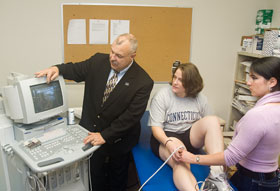  |
| HOME | THIS ISSUE | CALENDAR | GRANTS | BACK ISSUES | < BACK | NEXT > |
Exercise scientist recognized for research accomplishmentsby Beth Krane - November 28, 2006 |
||||
| Should men and women, young and old, Olympic athletes and couch potatoes follow the same weight-training regimen? Do Lycra shorts enhance athletic performance? Does genetic makeup predict the body's response to exercise? Can strength and conditioning exercises boost the immune system? The go-to person for all of these questions is kinesiology professor William Kraemer, an internationally renowned expert in exercise physiology, sports medicine, and strength and conditioning. Kraemer recently received two honors recognizing the breadth and depth of his research contributions to the fields of sports medicine and exercise science. In May, he was one of two professors recognized during the undergraduate commencement ceremony as recipient of the University's highest research award, the Provost’s Research Excellence Award. And a couple of months later, the National Strength and Conditioning Association, the leading authority on strength and conditioning worldwide, attached Kraemer's name to its most prestigious research award. The William J. Kraemer Outstanding Sport Scientist Award was presented for the first time during the association's annual meeting in July. Professor Carl Maresh, head of the kinesiology department, says he nominated Kraemer for the Provost's award because he is one of the most prolific researchers at the University. He has more than 300 publications, 46 chapters, and 10 books to his name. Maresh calls him "one of the pre-eminent exercise scientists in the world today." He says Kraemer "may well be the most recognized exercise scientist in the world today, recognized by practitioners in the fitness industry and research scientists alike. His research runs the gamut from very practical to sophisticated molecular research." In addition to his primary post in the kinesiology department's Human Performance Laboratory, Kraemer also holds joint appointments in the physiology and neurobiology department and the School of Medicine.
He has been awarded $2.4 million in research grants since joining the UConn faculty five years ago, and more than $7 million during his career to date. Maresh and the NSCA both cite Kraemer's reputation for "bridging the gap" between laboratory scientists and field practitioners, as well as his ability to communicate complicated scientific data effectively to the media and the public at large. Kraemer emphasizes the practical implications of research. The editorial mission statement of the Journal of Strength and Conditioning Research, which he developed and has edited for 20 years now, notes that a special feature of the journal is that it contains recommendations for the practical use of the research findings it publishes. The NCSA said in a press release that the award was named for Kraemer because of his "exceptional and continuing scientific contributions both to the NCSA and to the field of exercise and sport science research." Kraemer was the first to identify the proenkephalin Peptide F hormone in human blood and to demonstrate its responses and adaptations to exercise, recovery, and training. He also has studied the effects of resistance training programs on bone, novel growth hormone variants, muscle and the body's endocrine and immune systems; the compatibility of endurance and resistance training; the detrimental effects of overtraining; and the effects of resistance training on women and aging exercisers. He has consulted and conducted research for the International Olympic Committee, the National Aeronautics and Space Administration, and the Department of Defense, among other organizations.
|
| ADVANCE HOME UCONN HOME |

